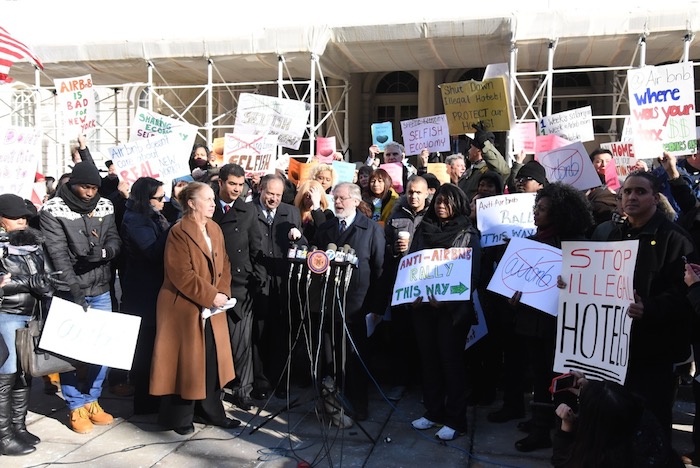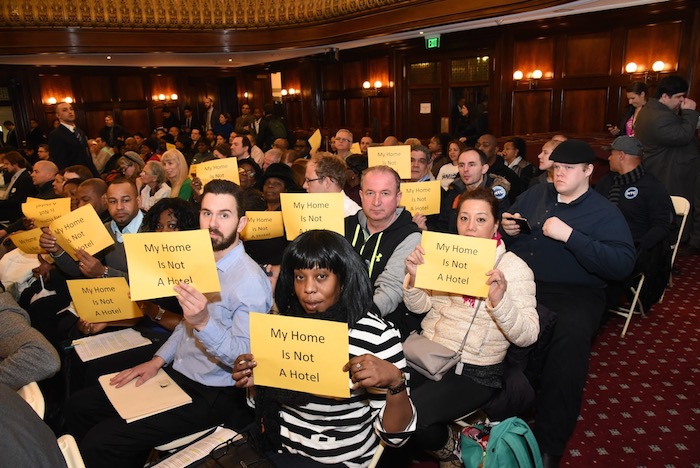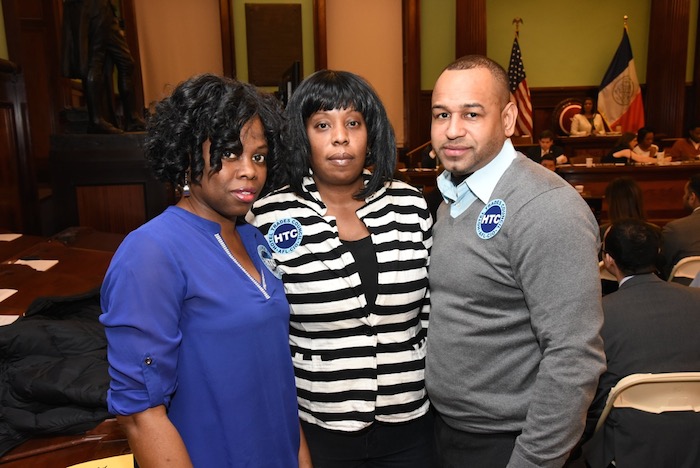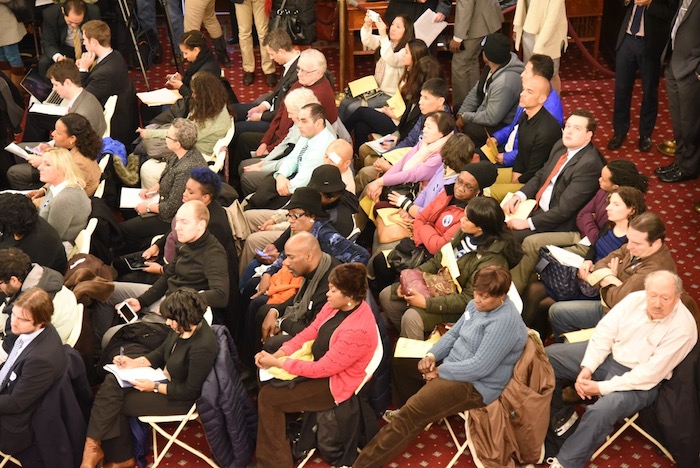City Council Hearing on Illegal Hotels Draws Huge Turnout
Hundreds of members of our Union were joined by many members of the public at a January 20th New York City Council hearing regarding the law that prohibits people from renting out their apartments for under 30 days. The Airbnb company brought people to the hearing, too, but they were far outnumbered by supporters of the law who want to see it strengthened and strictly enforced.
The complaints at the hearing from the public about Airbnb were both serious and plentiful, and City Council members responded accordingly. The event drew a wide amount of publicity, emphasizing the seriousness of this issue, and some of our members were even featured in a huge picture in the New York Times.
The hearing was held before the Council’s Housing and Buildings Committee. It was clear from the start that committee members were in no mood to hear about the so-called benefits of what Airbnb calls “the sharing economy.” Instead, there were comments like those made by Councilman Corey Johnson, who said, “No one should have to live in a building or next to someone where the apartment is being used as an illegal hotel, people coming and going, traipsing in and out, no idea who they are.”
Councilman Johnson has cause for concern. He represents an area of Manhattan where, he says, Airbnb has around 2,000 listings.
Other interesting—and alarming—facts came out at the hearing, especially when an Airbnb executive had to admit that the company doesn’t keep track of how many of its users rent out apartments illegally. This led the committee’s chairperson, Councilman Jumaane Williams of Brooklyn to ask, “Isn’t that something a responsible company would do?”
Both Williams and Councilwoman Helen Rosenthal of Manhattan said that Airbnb needed to provide information on illegal rentals.
All day long—and the hearing lasted nine hours—members of the public and City Council members themselves shot back at Airbnb’s contentions that apartment sharing was good for the economy. It was noted that the so-called sharing service represents a threat to good-paying jobs and affordable housing. Many condo owners and apartment renters who have been impacted by the uncomfortable environment created by short term rentals to strangers came to the hearing. Some of them testified and quite a few came up to our members and thanked them for attending.
There were plenty of people present who are part of Share Better, a coalition of elected officials, affordable housing advocates, community organizations and others who are deeply concerned about the impact Airbnb is having on jobs, community safety and affordable housing.
Some citizens came to the hearing because of personal experiences. “It is evident that the law that prohibits these kinds of rentals needs to be strengthened,” said Brooklyn apartment renter Douglas Reynolds, who personally thanked members of our Union for coming to the hearing. “It’s great seeing that so many share my concerns about illegal rentals and illegal hotels.”
Members began lining up for the hearing as early as 7:30 a.m. and within an hour the line stretched all the way up the block. At 9:00 a.m. a line of members began to form on the east entrance to the City Hall complex, too. Some of them had made colorful signs and all of them understood the issues regarding companies like Airbnb.
While the hearing was taking place inside the City Council’s chambers there were dualing press conferences outside City Hall. Airbnb presented some users who decried the high cost of housing in New York and claimed that they can only afford their apartments by using the company to temporarily rent them out. But there were far more people present who said that companies like Airbnb were not only not resolving the high cost of housing in New York but in reality were greatly contributing to the problem.
The City Council chamber was packed for the hearing, which went on for quite a long time because so many people wanted to testify.
Three of our members offered testimony at the hearing. Lesley-Ann Cooper delivered her testimony in person, and members Stanley Marte and Karlene Longchallon gave their testimony through written submissions to the committee. The Union’s political and strategic affairs director, Josh Gold, also testified in person.
“My lease is set to expire this August and I’m very worried that my new landlord, who bought the building in 2013, will not renew it,” Cooper, a Westin Times Square employee, told the committee. “I fear that I’m going to be pushed out because now even small apartments are being rented for $2,000 and up. I know that it is not just my neighborhood. I know that it is happening all over the city. Those in this same predicament that I talk to say the same thing: that Airbnb is driving rents up and pushing long-time residents out so they can make more money.”
Everyday I see more and more Airbnb rentals all over Williamsburg and it’s causing skyrocketing rents to soar even higher, said Plaza Hotel employee Stanley Marte, in written testimony submitted to the committee. “All of my neighbors are very worried about what Airbnb is doing to our neighborhood. They don’t feel like it’s their home anymore.”
In additional written testimony provided to the committee, Royalton employee Karlene Longchallon, a resident of East Flatbush in Brooklyn, said, “Despite the fact that I have a good job, it’s becoming harder and harder for me to afford to live in the community that I’ve called home for 25 years. There are thousands of Airbnb sites around Brooklyn, and it is making the already troubling affordable housing crisis much worse.”
The Union’s political and strategic affairs director, Josh Gold, told the committee that the members of our Union face a dual threat from illegal hotels. He pointed out that these properties and their temporary rentals violate zoning and other laws. He added that they compete unfairly with the legitimate hotel industry by failing to pay commercial property taxes and other taxes, and by pushing down room rates citywide, which will result in attempts to suppress wages.
“Until just four years ago, because of a loophole, city law enforcement had been largely unable to shut down illegal hotels, protect the legitimate tourism industry and maintain the housing stock that is being lost to this form of illegal conversion,” Gold testified. “Thanks to the hard work of elected officials throughout New York—including many officials who testified today—that loophole was finally closed and enforcement agents are at last able to do their job. Two years ago, the Council increased fines on illegal hotel operators, so that fines weren’t just the cost of doing business. Now the Council should consider increased funding for the Mayor’s Office of Special Enforcement so that the office has the tools and capability to rid the city of large illegal operators.”
There were plenty of other people at the hearing testifying about the damage done by illegal hotels. The audience was reminded that Attorney General Eric Schneiderman issued a report in October that showed that commercial operators are responsible for more than a third of the Airbnb units in New York City, shooting down the argument that short term rentals are needed to bolster the income of permanent renters.
There’s more. One official, Elizabeth Glazer, who is the head of the Mayor’s Office of Special Assessment, told the committee that there had been a 62 percent increase in complaints about short term apartment rentals in 2014. Some City Council members said that this was evidence of the need for stronger enforcement of the law barring these types of rentals, as well as more funding and the other tools necessary to be proactive in carrying out that enforcement.
There will certainly be other steps taken in the future to address this issue. Hotel Voice will keep members informed about these steps.






